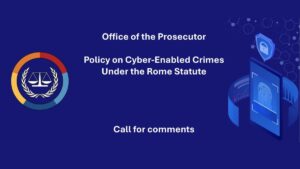
Introduction:
Dear colleagues, On March 7, 2025, the Office of the Prosecutor (OTP) of the International Criminal Court (ICC) launched a public consultation on its draft policy titled “Cyber-Enabled Crimes under the Rome Statute.” The OTP has invited feedback from legal experts, civil society, academics, and technical professionals. Submissions are open until May 30, 2025.
This short article explains the nature and goals of the policy, clarifies what cyber-enabled crimes are, and distinguishes them from future potential crimes that are not yet part of the ICC’s jurisdiction.
Understanding Cyber-Enabled Crimes:
This policy is not proposing new crimes, but rather aims to explain how existing crimes already under ICC jurisdiction (genocide, crimes against humanity, war crimes, and the crime of aggression) can be committed using digital or cyber tools.
Cyber-enabled crime, which has been explained in the OTP Policy, refers to crimes within the jurisdiction of the Court, that is, genocide, crimes against humanity, war crimes, and aggression, as set out in Article 5 of the Rome Statute, or offences against the administration of justice at the Court under Article 70, when these crimes are committed or facilitated with the use of cyber means.
For instance:
- A cyberattack that shuts down a hospital’s electricity during armed conflict could be a war crime under Article 8(2)(b)(xxiii), intentionally directing attacks against hospitals.
- The coordinated use of social media to incite violence against an ethnic or religious group might amount to crimes against humanity under Article 7(1)(h), persecution against any identifiable group, or genocide under Article 6(c), or deliberately inflicting conditions calculated to destroy a group.
Why Now?
The OTP has taken this initiative for several reasons:
- Modern Crimes Use Cyber Tools: Though the Rome Statute doesn’t mention technology, crimes increasingly involve cyber components.
- Legal and Investigative Clarity: Prosecutors need clear guidelines on collecting digital evidence, establishing intent, and linking digital actions to physical harm.
- Readiness for Future Crimes: As technology evolves, the ICC must stay capable of handling crimes committed via Artificial Intelligence (AI), remote systems, or digital coordination.
- Cross-border Challenges: Cyber-enabled crimes often cross a country’s jurisdictions. A policy helps maintain consistency in how these should be handled.
It’s essential to distinguish between cyber-enabled crimes and cybercrimes. Cyber-enabled crimes are offenses that already exist under the ICC’s jurisdiction (e.g., genocide, war crimes) but are committed with the help of digital tools. On the other hand, cybercrimes are independent crimes such as cyberterrorism, large-scale hacking, or digital sabotage that are not currently included in the Rome Statute. To include cybercrimes under the Court’s jurisdiction in the future, a formal amendment would need to be proposed and adopted by the Assembly of States Parties (ASP), in accordance with the Rome Statute.
Conclusion:
This draft policy is a proactive and necessary step to ensure that the ICC remains effective in addressing crimes in a rapidly evolving digital world. While it doesn’t alter the legal scope of the Court’s jurisdiction, it clarifies how existing crimes can be prosecuted when cyber tools are involved. The invitation for public input ensures that legal experts, technologists, and human rights defenders all have a voice in shaping this new direction in international criminal justice.
Written by: IAICL on 17th March 2025
_______________________________________________________________________________________________________
Relevant Rome Statute Articles
- Article 5 – Crimes within the jurisdiction of the Court
- Article 6 – Genocide
- Article 6(c) – Deliberately inflicting conditions calculated to destroy a group
- Article 7 – Crimes Against Humanity
- Article 7(1)(h) – Persecution against an identifiable group
- Article 8 – War Crimes
- Article 8(2)(b)(xxiii) – Intentionally directing attacks against hospitals
- Article 70 – Offences against the administration of justice
Sources
- International Criminal Court official website: www.icc-cpi.int
- Rome Statute of the International Criminal Court
- ICC Press Release, March 7, 2025: “Public Consultation on Policy on Cyber-Enabled Crimes”
- Human Rights Watch commentary on technology and international law
- ICC Policy Paper on Sexual and Gender-Based Crimes (structural reference)
- Draft Policy on Cyber-Enabled Crimes under the Rome Statute
March 15th, 2025

